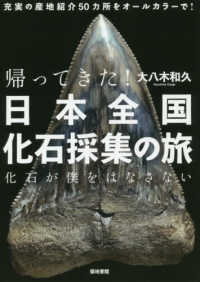- ホーム
- > 洋書
- > 英文書
- > Science / Mathematics
Full Description
Membrane-Based Separation in Metallurgy: Principles and Applications begins with basic coverage of the basic principles of the topic and then explains how membrane technology helps in the development of new environmentally friendly and sustainable metallurgical processes. The book features the principles of metallurgical process and how widely the membrane-based technology has been applied in metallurgical industry, including the basic principles of membrane-based separation in terms of material science, membrane structure engineering, transport mechanisms, and module design, detailed metallurgical process flowcharts with emphasis on membrane separations, current process designs, and describes problems and provides possible solutions.
In addition, the book includes specific membrane applications, molecular design of materials, fine tuning of membrane's multi-scale structure, module selection and process design, along with a final analysis of the environmental and economic benefits achieved by using these new processes.
Contents
Part 1: Introduction
1. Metallurgy: Importance, Processes, and Development Status
2. Membrane-Based Separation
Part 2: Membrane-Based Separation for Metallurgical Process Improvement and Wastewater Treatment
3. Ferrous Metallurgy
4. Heavy Nonferrous Metals
5. Light Nonferrous Metals
6. Refractory Metals
7. Scattered and Rare Earth Metals
8. Radioactive Metals
9. Noble Metals
10. More Works on Waste Treatment and Process Improvement
Part 3: Development of Special Industrial Membranes for Metallurgy
11. Overview
12. Polymeric Membranes
13. Membrane Contactor
14. Ceramic Membranes
15. Metal Membranes








